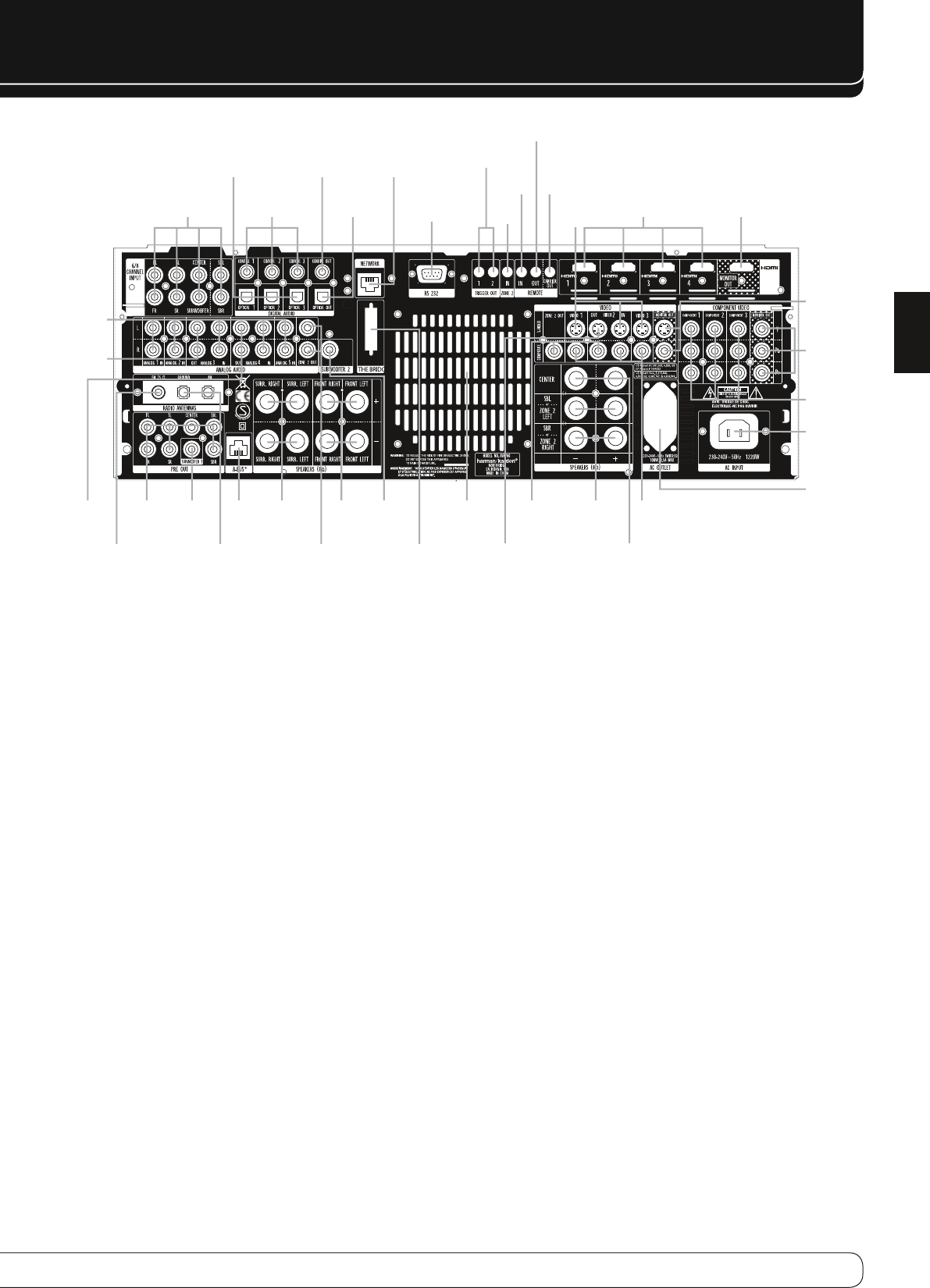
9
ENGLISH
REAR-PANEL CONNECTIONS
6-/8-Channel
Inputs
Optical 1, 2 & 3
Digital Audio
Coaxial Digital
Audio Output Network
Trigger Outputs
1 & 2
Remote IR
Output
Coaxial 1, 2 & 3
Digital Audio
Analog 4
Outputs
Preamp
Outputs
Subwoofer 1
Output
Subwoofer 2
Output
(AVR 760 only)
Composite
1, 2 & 3
Zone 2 Video
Output
Surround
Back/Zone 2
Speaker
Outputs
FM Antenna AM Antenna Zone 2
Audio Outputs
The Bridge II S-Video 2
Output
Center Speaker
Outputs
Fan VentsSurround
Speaker
Outputs
Front
Speaker
Outputs
A-BUS
Port
Optical Digital
Audio Output HDMI 1, 2, 3 & 4
HDMI Monitor
OutputRS-232 Port
Zone 2
IR Input
Remote IR
Input
Carrier IR
Output
Video Monitor
Outputs
Analog 1-5
Inputs
Analog 3
Outputs
Component Video
Monitor Outputs
Component
1, 2 & 3
Switched AC
Accessory Outlet
AC Power
Input
S-Video
1, 2 & 3
6-/8-Channel Inputs
: Connect the multichannel analog audio outputs
of a non-HDMI player (DVD-Audio, SACD™, Blu-ray Disc™ or HD-DVD, or any
other external decoder) to these jacks.
Coaxial 1/2/3 and Optical 1/2/3 Digital Audio Inputs
: If a source
has a compatible digital audio output, and if you are not using an HDMI
connection for audio for the device, connect it to one of these jacks to hear
digital audio formats, such as Dolby Digital, DTS and linear PCM. Use only one
type of digital audio connection for each source.
Coaxial and Optical Digital Audio Outputs
: If a source is also an
audio recorder, connect one of the Digital Audio Outputs to the recorder’s
matching input for improved recording quality. Only PCM digital audio signals
are available for recording. Both coaxial and optical digital audio signals are
available at either Digital Audio Output.
Network Jack
: Plug in an RJ-45-compatible cable that connects to a
personal computer (PC), router or Internet access. When connected to a PC,
the AVR 760/AVR 660 is capable of playing audio and JPEG files stored on the
PC. When connected to the Internet, the AVR 760/AVR 660 may be used to
enjoy Internet Radio. See pages 36 and 37 for more information.
RS-232 Serial Port
: This bi-directional port may be used to control
the AVR 760/AVR 660 using an RS-232 serial control link to a compatible
computer or programmable remote control system. Due to the complexity of
programming RS-232 commands, connections and programming for control
purposes should be performed by a qualified custom installer.
Trigger 1 and 2 Outputs
: Connect these control jacks to the trigger
input jack of an external component, such as an audio power amplifier, that
you want to power on any time the AVR 760/AVR 660 is turned on, without
using the AVR’s Switched Accessory Outlet for power. When this connection
is used, the AVR 760/AVR 660 will automatically send a low-voltage signal to
the connected device that triggers it to turn on when the AVR 760/AVR 660
is on, and off when the AVR 760/AVR 660 is placed in the Standby Mode. The
connected component must respond to 6-volt presence as the control signal.
The Trigger 2 Output may be programmed to transmit its signal only when
certain of the AVR’s source inputs are selected. For example, to lower a screen
when watching a DVD movie, but not while listening to the tuner, connect
the Trigger 2 Output to the screen and program it to be on when the DVD
source is selected, but off when the AM or FM bands are in use. See the Initial
Setup section for more information on programming this setting in the Info
Settings menus for each source.
Zone 2 Infrared (IR) Input
: Connect a remote IR receiver located in the
remote zone of a multizone system to this jack to control the AVR (and any
source devices connected to the Remote IR Output) from the remote zone.
Remote Infrared (IR) Input and Output
: When the remote IR
receiver on the front panel is blocked, connect an optional IR receiver to the
Remote IR Input jack. The Remote IR Output may be connected to the Remote
IR Input of a compatible product to enable remote control through the AVR.
Remote IR Carrier Output
: This output is similar in function to the
Remote IR Output, with the difference that this jack outputs the full infrared
signal as received by the AVR’s IR sensor or the Remote IR Input, while
the Remote IR Output jack outputs a “stripped” signal that has no carrier
frequency.


















